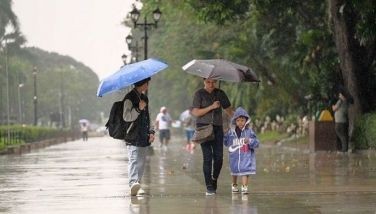Sayyaf contact of expelled Iraqi linked to 2 bomb plots
February 19, 2003 | 12:00am
A cell phone used by a member of the Abu Sayyaf Muslim extremist group to call an Iraqi diplomat was later used in a failed attempt to trigger a bomb, according to a confidential Philippine intelligence report.
Iraq embassy Second Secretary Husham Hussain was expelled last week after the report claimed he received a call from an Abu Sayyaf member on Oct. 3, 2002, a day after a bomb in Zamboanga City killed a US soldier and two other people.
The caller was not identified. The Iraq embassy denied any links to Philippine dissident groups, including the Abu Sayyaf, which is on a US list of foreign terrorist organizations and has been loosely linked to al-Qaeda.
Six days after the contact was made, the caller’s cell phone was used to try to set off another bomb in Zamboanga’s San Roque district, near the military’s Southern Command headquarters, but it failed to go off, according to the intelligence report, obtained by The Associated Press.
The bomb and the cell phone were later recovered by police, a security official said. The cell phone listed contacts for Hamsiraji Sali, one of five Abu Sayyaf leaders on a US wanted list.
Sali, believed to be hiding in Basilan, has threatened to launch terror attacks in Manila and other Philippine cities if the United States attacks Iraq, the intelligence report said.
Intelligence reports linking Hussain to the Abu Sayyaf were discussed in a Cabinet committee dealing with security a few weeks ago. According to the security official, officials expressed concern that Iraq could somehow retaliate if Hussain was expelled, but other officials disagreed, citing the 1991 expulsion of another Iraqi diplomat.
That year, the Philippines kicked out then Iraqi charge d’affaires Muwafak al-Ani after an Iraqi man was killed and another wounded in the premature detonation of a bomb believed intended for the Thomas Jefferson Cultural Center in Makati.
Last week, Foreign Secretary Blas Ople confronted Iraqi charge d’affaires Samir a-Masih Bolus with the intelligence report linking Hussain to the Abu Sayyaf. But the government has not offered evidence beyond the phone call, and said more detailed information could not be released because the sources could be compromised.
Before he left the country last Thursday, Hussain denied any wrongdoing. In Baghdad, a Foreign Ministry spokesman labeled Manila’s decision to expel Hussain as part of an extensive US propaganda campaign "in order to distort the position of Iraq and to fabricate false evidence by which the US administration could justify its colonial and Zionist campaign against Iraq."
The intelligence report said other Iraqi diplomats in the country were being monitored.
In a telephone conversation last week with President Arroyo, US President George W. Bush expressed concern over "the direct terrorist link" of the Iraq Embassy here, Presidential Spokesman Ignacio Bunye said. The US Embassy also expressed concern, saying the intelligence revelations were "very disturbing but hardly surprising."
Iraq embassy Second Secretary Husham Hussain was expelled last week after the report claimed he received a call from an Abu Sayyaf member on Oct. 3, 2002, a day after a bomb in Zamboanga City killed a US soldier and two other people.
The caller was not identified. The Iraq embassy denied any links to Philippine dissident groups, including the Abu Sayyaf, which is on a US list of foreign terrorist organizations and has been loosely linked to al-Qaeda.
Six days after the contact was made, the caller’s cell phone was used to try to set off another bomb in Zamboanga’s San Roque district, near the military’s Southern Command headquarters, but it failed to go off, according to the intelligence report, obtained by The Associated Press.
The bomb and the cell phone were later recovered by police, a security official said. The cell phone listed contacts for Hamsiraji Sali, one of five Abu Sayyaf leaders on a US wanted list.
Sali, believed to be hiding in Basilan, has threatened to launch terror attacks in Manila and other Philippine cities if the United States attacks Iraq, the intelligence report said.
Intelligence reports linking Hussain to the Abu Sayyaf were discussed in a Cabinet committee dealing with security a few weeks ago. According to the security official, officials expressed concern that Iraq could somehow retaliate if Hussain was expelled, but other officials disagreed, citing the 1991 expulsion of another Iraqi diplomat.
That year, the Philippines kicked out then Iraqi charge d’affaires Muwafak al-Ani after an Iraqi man was killed and another wounded in the premature detonation of a bomb believed intended for the Thomas Jefferson Cultural Center in Makati.
Last week, Foreign Secretary Blas Ople confronted Iraqi charge d’affaires Samir a-Masih Bolus with the intelligence report linking Hussain to the Abu Sayyaf. But the government has not offered evidence beyond the phone call, and said more detailed information could not be released because the sources could be compromised.
Before he left the country last Thursday, Hussain denied any wrongdoing. In Baghdad, a Foreign Ministry spokesman labeled Manila’s decision to expel Hussain as part of an extensive US propaganda campaign "in order to distort the position of Iraq and to fabricate false evidence by which the US administration could justify its colonial and Zionist campaign against Iraq."
The intelligence report said other Iraqi diplomats in the country were being monitored.
In a telephone conversation last week with President Arroyo, US President George W. Bush expressed concern over "the direct terrorist link" of the Iraq Embassy here, Presidential Spokesman Ignacio Bunye said. The US Embassy also expressed concern, saying the intelligence revelations were "very disturbing but hardly surprising."
BrandSpace Articles
<
>
- Latest
- Trending
Trending
Latest
Trending
Latest
Recommended
































